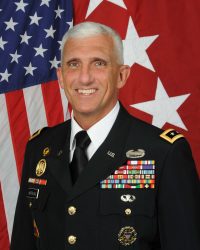Like the vast majority of you, I never thought I’d ever experience or be a part of a pandemic. A month ago, if you’d have told me we’d be where we’re at right now, I’d have thought you were crazy. Yet here we are. The vast majority of the nation is on self-quarantine, hospitals around the US have been caring for the first wave of COVID-19 patients and healthcare providers are experiencing a battle they will surely never forget.
Recognizing that a discussion around frontline providers’ experiences was needed – and spurred by a recent article in the Journal of Hospital Medicine (“Ten Tips for a Crisis: Lessons from a Soldier”) by Lt. General Mark Hertling (ret) – we decided to have a special #JHMChat on “Leadership in a Time of Crisis.”

Lt. Gen. Hertling (ret)
General Hertling is a former US Army officer who commanded the 1st Armored Division and Task Force Iron/Multinational Division during the Iraq War (among many other notable accomplishments). Since he retired, he’s been teaching leadership to doctors, nurses, clinicians and administrators at a major healthcare system and is the author of the book Growing Physician Leaders. We built off of Mark’s article and past experiences and held one of our most attended and widely disseminated #JHMChats ever – with over 200 participants and >10 million impressions. Given all this, I couldn’t help but reach back out to General Hertling to get his take on the discussion.
Charlie: Mark, as a non-physician, what was one of your major takeaways from the #JHMChat?
Mark: From the very beginning of the discussion, it was obvious that the participating physicians and nurses were commenting on the new leadership roles they had assumed during the crisis. Comments regarding the expansion of their roles, the requirement to execute new missions, the opportunity to lead more diverse teams, and most especially their observations on how their organizations had changed. All of these usually occur when teams are placed in extremely challenging crisis situations. But what is important is that the physicians in the chat were commenting on how they were filling these roles because others were expecting them to step into them due to their skills and professional competencies.
A2. We have had incredible Divisional and Departmental communication. Zoom calls and end-of-day update emails, real-time revision of policy comms. We’ve done well with communication.
Front-line presence of our ACMO numerous xs day on COVID units has also been great. #JHMchat
— Brian McGillen, MD (@bmcgillen26) April 8, 2020
Charlie: Given your experiences and background, you are an expert on leadership. What did you learn about physician-leadership during this crisis from our discussion?
Mark: First, I’ll push back a bit on your assertion. If you ever hear anyone proclaim they are an “expert” in leadership, I’d recommend not paying them much attention! That’s especially true in healthcare. Leading is tough, and it’s exponentially tougher when a lot of diverse people coming from different cultural training and backgrounds – like doctors, specialists, nurses, administrators, government regulators, patients from all walks of society – are part of the occasion. Add a crisis scenario like COVID-19, and you have an extremely complex leadership environment. As someone who has studied leadership, that’s what makes this current situation so interesting.
During my recent doctoral studies, I found tons of research that proclaims there is a lack of trust between doctors and administrators, and more research notes the poor communication methods between physicians and nurses (and other clinicians). All this contributes to dysfunctional organizations.
The solution, in my view, is that healthcare must institute interprofessional training. While some in healthcare hierarchy see this as a need – and I’ve noticed that JHM has emphasized this method of training and educational approach – few other organizations have instituted this method. But organizations or professions that find themselves functioning in crisis situations – like we’re seeing now – quickly understand that leaders must always build diverse and high-performing teams. That’s what is happening now. Physicians are thrust into leadership roles, they are forming teams while making decisions at a breakneck pace and they are overcoming bureaucracies that exist in peacetime. The physicians that lead during this crisis will likely ensure their organizations never return to their old ways. I’m already seeing that in the hospital system I work for, and it is magnificent.
As someone often frustrated with hospital meetings, the often slow pace of change and endless barriers – suddenly we are having the most efficient and impactful meetings with sudden innovation and change happening. Everybody pitching in. It’s incredible! #JHMChat
— Chris Moriates, MD (@ChrisMoriates) April 8, 2020
Charlie: Finally, in your opinion, why is it important that we have these discussions?
Mark: It’s critical you have these discussions, and I applaud you and your team at JHM for using my article and our Twitter chat to stimulate further discussions. One of the things I addressed in the “top ten” article is that great organizations must adapt quickly; they don’t wait for a pause to make the change, and that causes them to “win the fight.” JHM’s actions are contributing to that rapid adaptation and directed agility by providing the venue and the additional opportunity for adjustment. That’s part of value of being in a professional organization with an energized professional journal. You have provided your professionals with a platform, and it quickly became obvious to me that they took advantage of it. I was stoked after that Twitter chat, and I want to thank you for including me on this growth opportunity.
Charlie: Thanks for all your insights and time, Mark. It was a pleasure working with you on this project!
A4: this. In 3 weeks we’ve restructured our system in ways I ??will last. More tele-medicine. Better collaboration. Less documentation. No billing worries. Geographic teams. Interdisciplinary rounding. Leaders on the floor. No red tape. Everything 4 our pts!! #jhmchat https://t.co/H1P9t1wbVD
— Valerie Vaughn (@ValerieVaughnMD) April 8, 2020
We believe there were some incredibly poignant and insightful comments in our discussion and urge people to read the transcript from the discussion. For more information on COVID-related issues within hospital medicine, please go to the Journal of Hospital Medicine’s website or follow us on Twitter – where content is being updated daily – and also review SHM’s COVID-19 Resources page on its website.



Leave A Comment